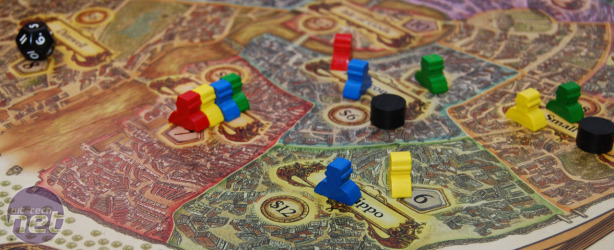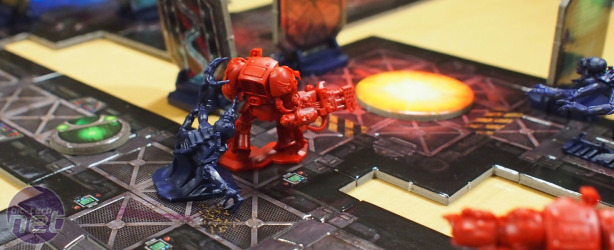Video games took that language and ran, building systems based on the D20 mechanic that D&D popularised. But moving away from the table inherently changed the nature of gaming; choices narrowed, stories became less fluid and experiences became lonelier.
While there are still obvious connections, board and video games are now two disparate entities, linked by a common ancestor but built on fundamentally different foundations. In a time when some claim the video game industry is beset by a malaise, trapped in a cycle of unimaginative iterations, perhaps board games can once again step up and offer some solutions?
'Despite claiming to be interactive, computer games are still struggling with the genetics of passive entertainment,' says James Ernest, designer for Cheapass Games - a company specialising in downloadable, print your own board games.

Ankh-Morpork: The Game
'They must cater to players who refuse to read manuals or learn strategies; thus, they present extremely winnable scenarios in an effort to guide players through the process of learning the game. They also rely on players’ past experiences with other games to a greater extent than their tabletop equivalents.'
This in turn, has lead video games to the cul-de-sac it finds itself in today. Tabletop games have categories like board game, card game, dice game, and so on; but computer games have much stricter definitions of their categories - an FPS is defined by its style, as much as its format.
'First Person Shooters are more similar, as a category, than even the narrowest sub genre of tabletop games,' says Ernest. 'The similarities between games in a specific genre are a product of the passivity of players, but also of two other factors: general conservatism in the industry, and the path that designers typically take into the industry.'
'The conservatism holds that it’s safer to fund a game if it is an improvement on an existing game, rather than an unproven new mechanic. And the designer’s path tends to lead through programming, which means that most designers are more interested in the mechanics of games than in the art of storytelling.'

Soace Hulk: Third Edition
For Ernest, this is the most important point. The video game industry has difficulty discerning the difference between designers and developers. In the board game world, these are two separate jobs; a designer creates an original game mechanic from nothing, then a developer hones that game and makes it into something playable, explains Ernest.
Board games don't need programmers; the engine that powers the game is a rule set based not on the mathematical limitations and possibilities of a machine, but on abstractions from a central theme.
In video games you press the button to swing your sword and the game calculates your success, in board games you perform the maths yourself, and what the game provides is an imaginative link between you rolling your dice and a creature's head falling off.
No comments:
Post a Comment